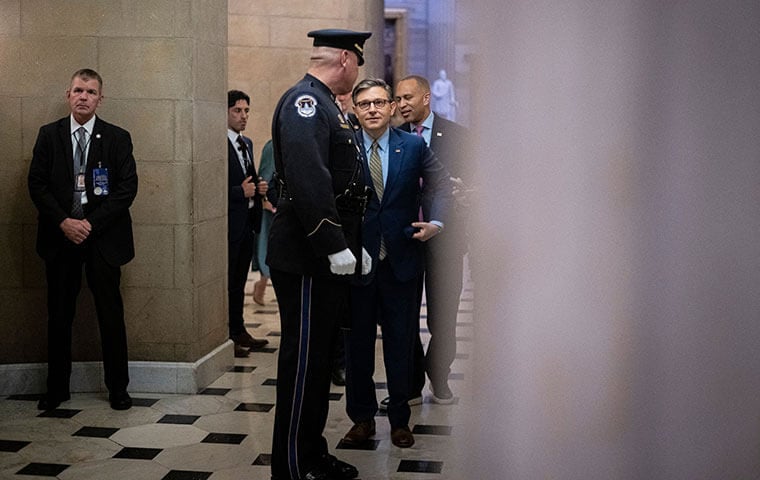 US Speaker of the House Mike Johnson (2-R) (R-LA) and House Minority Leader Hakeem (R) Jeffries (D-N.Y.) arrive, before a ceremony to commemorate the bicentennial of the Marquis de Lafayette's Address to the 18th Congress in Statuary Hall of the US Capitol in Washington, DC, USA, 10 December 2024. Image: GRAEME SLOAN/EPA-EFE/Shutterstock
By: FEDweek Staff
US Speaker of the House Mike Johnson (2-R) (R-LA) and House Minority Leader Hakeem (R) Jeffries (D-N.Y.) arrive, before a ceremony to commemorate the bicentennial of the Marquis de Lafayette's Address to the 18th Congress in Statuary Hall of the US Capitol in Washington, DC, USA, 10 December 2024. Image: GRAEME SLOAN/EPA-EFE/Shutterstock
By: FEDweek StaffSeveral bills were offered recently that, while coming too late for enactment in the current Congress, send a signal of Republican initiatives next year when they will control both the House and Senate as well as the White House.
Several of the measures again underscore moves to roll back telework by federal employees, including S-5429, to require agencies to “use software to gather concrete data on the adverse impacts of telework in the federal government” by monitoring employees’ computer use, said main sponsor Sen. Joni Ernst, R-Iowa. Also offered was HR-10234, to allow teleworkers to work offsite no more than 25 percent of the time.
Meanwhile, President-elect Trump has objected to the recent agreement by the SSA and the AFGE union to extend current telework policies—which allow an average of two days per week of offsite work for field office workers.
He said his administration would take that action to court—although presumably any effort to reverse it would have to go through FLRA channels first—and said that employees who refuse return-to -office orders should be fired.
In response, the AFGE said, “Collective bargaining agreements entered into by the federal government are binding and enforceable under the law. We trust the incoming administration will abide by their obligations to honor lawful union contracts. If they fail to do so, we will be prepared to enforce our rights.”
Trump also has raised the prospect of further privatization of the U.S. Postal Service, an idea from his first term that hit opposition from members of Congress from both parties. The USPS recently underwent testy hearing in both the House and Senate where Republican members highlighted as a problem that labor constitutes about four-fifths of its costs—which has been the case for decades.
Ernst, a co-chair of the new Senate DOGE (“department of government efficiency”) caucus, meanwhile signaled support for that commission’s intent to shift more jobs from the national capital area by introducing S-5501, to require the SBA to relocate 30 percent of employees assigned to headquarters outside that area.
And Rep. Barry Loudermilk, R-Ga., has reintroduced (HR-10397) a bill he has pushed for several years regarding disciplinary practices reflecting positions of the first Trump administration and themes being sounded by DOGE commission members and supporters.
The bill would: allow appeals of disciplinary actions only to the MSPB and not to arbitrators instead; allow SES members to be removed rather than just demoted on performance grounds; reduce employee rights to challenge furloughs, especially those related to budgetary lapses; extend from one year to two the standard probationary period when employees lack full appeal rights; and authorize agencies to order repayment of bonuses and awards when performance or conduct issues are later discovered that would have prevented the payments had the issues been known at the time.
Also, a move was made in the House to advance a stalled bill (HR-4278) to reverse the VA’s decision to stop using management-friendly disciplinary processes authorized for that department in 2017. The VA last year said that standard disciplinary procedures are sufficient and that using the special authorities had mainly resulted in tying it up in legal disputes.
Those cases resulted in several court decisions narrowing the VA’s leeway that would act as a barrier to any upcoming move to begin using those powers again. The bill would change the law to circumvent the court rulings and broaden management’s powers still further.
Deferred Resignation Periods about to End for Many; Overall 12% Drop
Retirement Surge Likely as Deferred Resignation Periods End
Senate Rejects Bills to Defer Shutdown; Familiar Process Lies Just Ahead
Senate Bill Would Override Trump Orders against Unions
Report Describes Impact of Shutdown on Employees, Agencies
TSP Adds Detail to Upcoming Roth Conversion Feature
See also,
How to Handle Taxes Owed on TSP Roth Conversions? Use a Ladder
The Best Ages for Federal Employees to Retire
Best States to Retire for Federal Retirees: 2025

